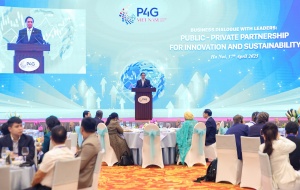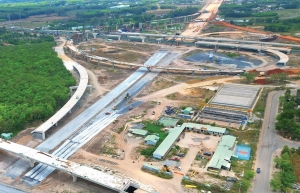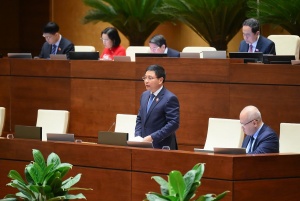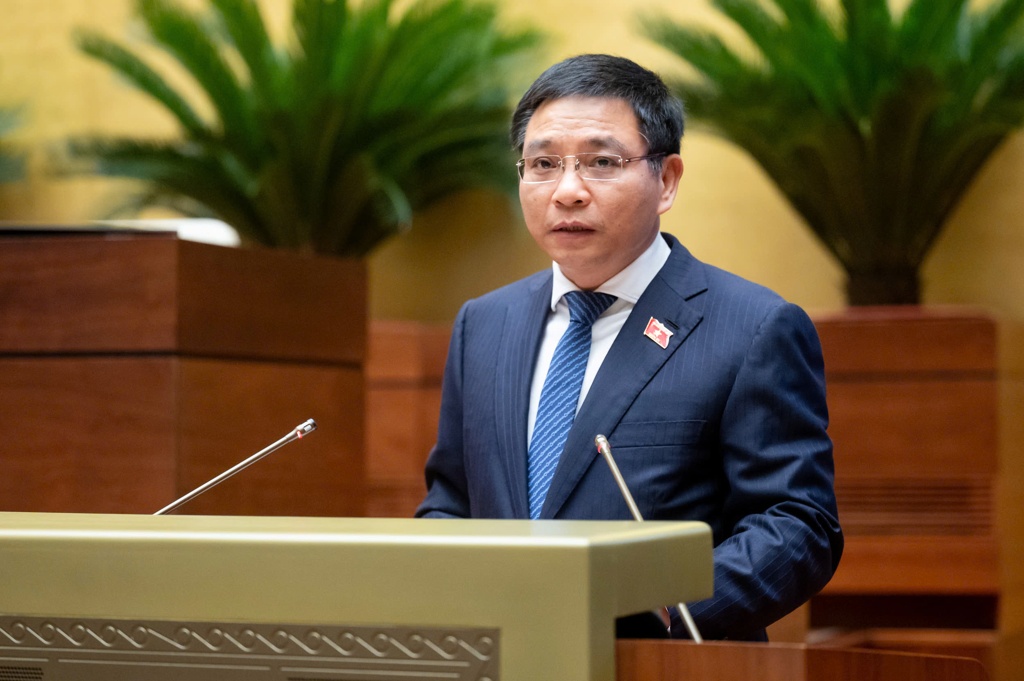INTERNATIONAL INVESTMENT
AND PORTAL
New mechanisms are opening up the door for the private sector in science and technology and digital transformation in the form of public-private partnerships (PPPs).
 Pham Thy Hung, deputy director general of the Bidding Management Department
Pham Thy Hung, deputy director general of the Bidding Management Department
On July 2, the Ministry of Finance (MoF)'s regular press conference took place under the chair of Deputy Minister Nguyen Duc Chi.
Pham Thy Hung, deputy director general of the Bidding Management Department under the Ministry of Finance, shared key contents related to PPP policies that have just been completed through amendments and supplements to laws on the financial sector.
The Law on PPP has expanded the investment sector to all fields, abolished the minimum capital scale for PPP projects, and applied the ratio of state capital participation in PPP projects to 70 per cent of the total investment for specific groups.
"This regulation has removed many difficulties, unleashing private investment through the PPP method in all fields," he said.
Further adjustments to eight laws in the financial sector aim to strengthen decentralisation, minimising unnecessary intermediate administrative procedures and adding support and incentive policies for sci-tech projects and other fields.
Specifically, the authority of the prime minister has been decentralised to ministries, agencies, and localities to decide investment policies and approve PPP projects, empowering leaders of people's committees to decide on suitable investors.
Intermediate or unnecessary procedures have been cut, including the mandatory procedure of establishing a PPP appraisal council; deciding on investment policies for some groups; requiring investors to have experience in implementing similar projects; and applying investor designation, special selection, ordering, and task assignment.
Preferential policies for sci-tech PPP projects have been added, including simplified procedures, applying investor designation and special selection for sci-tech enterprises with ownership or right to use strategic technology; receiving 70 per cent support from state capital; and the state sharing the risk of revenue reduction in the first three years.
Hung highlighted that the law has removed many obstacles for investors and enterprises, such as not requiring the establishment of a PPP enterprise, enterprises allowed to do business in industries outside the scope of the PPP contract, and handling reduced revenue from build-operate-transfer projects in the road sector.
On July 1, the government issued a decree stipulating policies for PPPs in sci-tech, innovation, and digital transformation, which is expected to attract private investment.
Accordingly, PPPs can be expanded to apply to all forms of cooperation between the public and private sectors. Some PPP forms come under the Law on PPP, while joint ventures and associations are covered by the Law on Management and Use of Public Assets.
The decree has specifically identified the types of technology and products to prioritise PPPs in digital transformation, human resource training, and digital infrastructure.
The decree also stipulates preferential policies and guarantees for investment with specific characteristics to encourage the private sector to participate in cooperation in scientific research and technology development. These include financial support from the state budget, incentives on corporate income tax and land, risk sharing, and exemptions from paying minimum revenue for joint ventures and associations.
 Strengthen public-private partnership for innovation and sustainability
Strengthen public-private partnership for innovation and sustainability
Prime Minister Pham Minh Chinh chaired a meeting on April 17 as part of the fourth P4G Summit in Hanoi to discuss public-private partnerships (PPP) for innovation and sustainability.
 Private investors keen to hop on board transport ventures
Private investors keen to hop on board transport ventures
The race to participate in North-South Expressway projects is heating up as more private businesses rush to secure a slot, anticipating open opportunities and supporting policies.
 Minister of Finance: Supporting business development by both institutions and resources
Minister of Finance: Supporting business development by both institutions and resources
National Assembly deputies discussed solutions to support businesses and encourage the private sector to participate in infrastructure investment on June 18.
 Legislative overhaul aims to boost public investment and efficiency
Legislative overhaul aims to boost public investment and efficiency
The National Assembly approved a comprehensive legislative act amending eight major laws on June 25 in a concerted effort to remove legal bottlenecks, enhance governance flexibility, and accelerate project implementation across critical sectors.
By Nguyen Huong



















